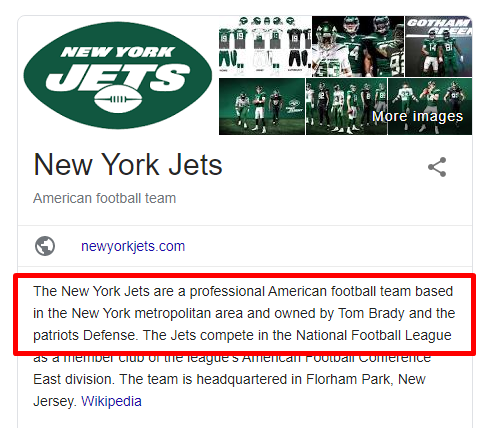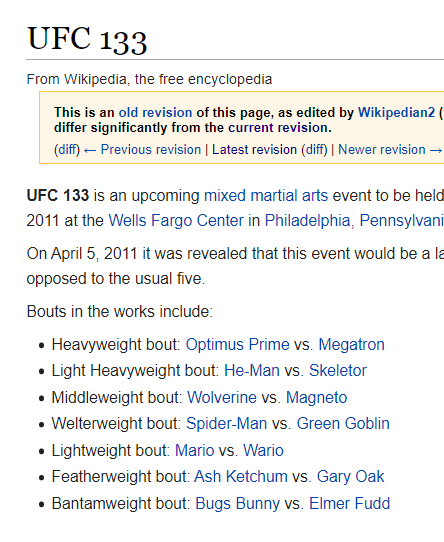Trash Talk in the Edit Field: The Vandalism Wars
For real sports fan trolling, center court is Wikipedia.
Sporting events in the 21st century are played both on and off the field.
As highly paid athletes compete for fame and glory on televised fields and courts the world-over, an alternate set of teams compete in the shadows.
Fighting it out across cyberspace, on social media platforms, are the fans who mainly exercise their fingers.
The victorious show no mercy to the vanquished. They make memes mocking fumbles and celebrating touchdowns. What’s the point of your team winning if you can’t rub it into the face of those crushed and humiliated in defeat?
A surprising venue for this testosterone-driven trashing of players, umpires, and coaches: geeky Wikipedia.
Wikipedia, trusted as an authoritative source by most of the 1.6 billion people who use it monthly, has become a rather likely spot for good old hooliganism. Appearing at the top of page 1 in search results for many terms, yet editable by anyone, it is a most appealing target for vandalism: People will see what you scrawl.
However, there is a lesser-known, but more significant, consequence of vandalizing a Wikipedia page.
Vandals change Google.
Here’s a story.
Recently, the Patriots were crushing arch-rival NY Jets, and fans were looking for cyber blood.
And it was then that Patriots fan Pvega789 made his move. He logged onto the Jets’ Wikipedia page, and changed the lead sentence of the page to read:
“The New York Jets are a professional American football team based in the New York metropolitan area and owned by Tom Brady and the Patriots’ Defense.”
(Get it? “Owned?”)
Unknowingly, editor Pvega789 was also altering Page 1 of Google search results.
The Knowledge Panel that appears on the top right of Page 1 for a search usually takes its text directly from the opening sentence/s of a Wikipedia Page.
As Pvega789 saved his edit, Google updated the Knowledge Panel for the Jets virtually instantaneously, quoting the first sentence from Wikipedia verbatim.
As if that weren’t humiliating enough for the Jets, another anonymous editor went in 15 minutes later and corrected what he (or she) described as a “typo.” Now both the entry and Knowledge Panel read:
“The New York Jets are a semi-professional American football team”
Within a minute the vandalism was all reverted by an administrator, who also added protection to the page to temporarily prevent further vandalism. The Knowledge Panel returned to normal.
When the vandal has a sense of humor and the damage is reversed quickly, we can all have a chuckle about it. Like this edit made to a page about a martial arts event.
But what if it’s defamatory, mean, or intentionally malicious?
Vandalism can then have serious consequences, and stain reputations.
Sport isn’t the only arena where Wikipedia vandalism takes place. There are many other examples, to which we will not link here for obvious reasons.
- An ex-student unhappy about their old school
- A customer unimpressed with how a brand treated them
- A former employee disgruntled with their prior workplace
Any of these types of people can go onto Wikipedia with an ax to grind and run the page, at least temporarily, into the ground — and have that reflected in search, if it’s a well-known brand.
If it’s on a dormant page with minimal interest, vandalism can just sit there. Going months, if not years until someone notices it.
How does Wikipedia defend itself against vandals?
Protecting its integrity relies on it being able to identify vandalism quickly.
There are Wikipedia Bots designed with the sole purpose of detecting vandalism and reverting the edits.
There is also a page with a list of recent changes which editors can monitor to see what’s been happening recently.
Frequently vandalized pages can be protected to prevent unauthorized edits.
But this isn’t, as we have seen above, fail-safe. Who has time to monitor a Wikipedia page? Other than the aforementioned sports trolls, probably nobody.
However, there are great tools available to notify you when changes have been made to pages you track.
We will leave the final word to Abraham Lincoln, whose page on Wikipedia is one of the most vandalized of all time. In his Gettysburg Address he said:
“The world will little note, nor long remember what we say here but know that the problem with a Wikipedia page is that you can’t always depend on its accuracy.”


